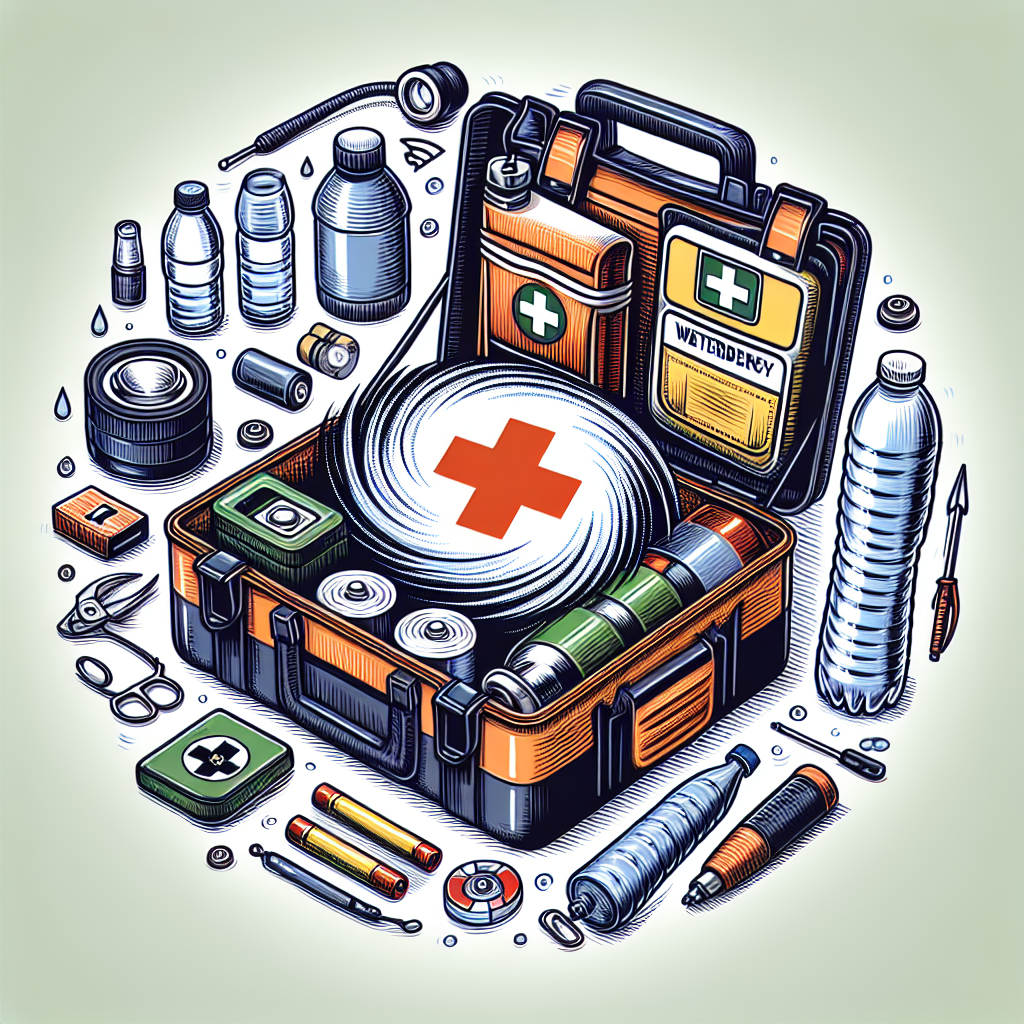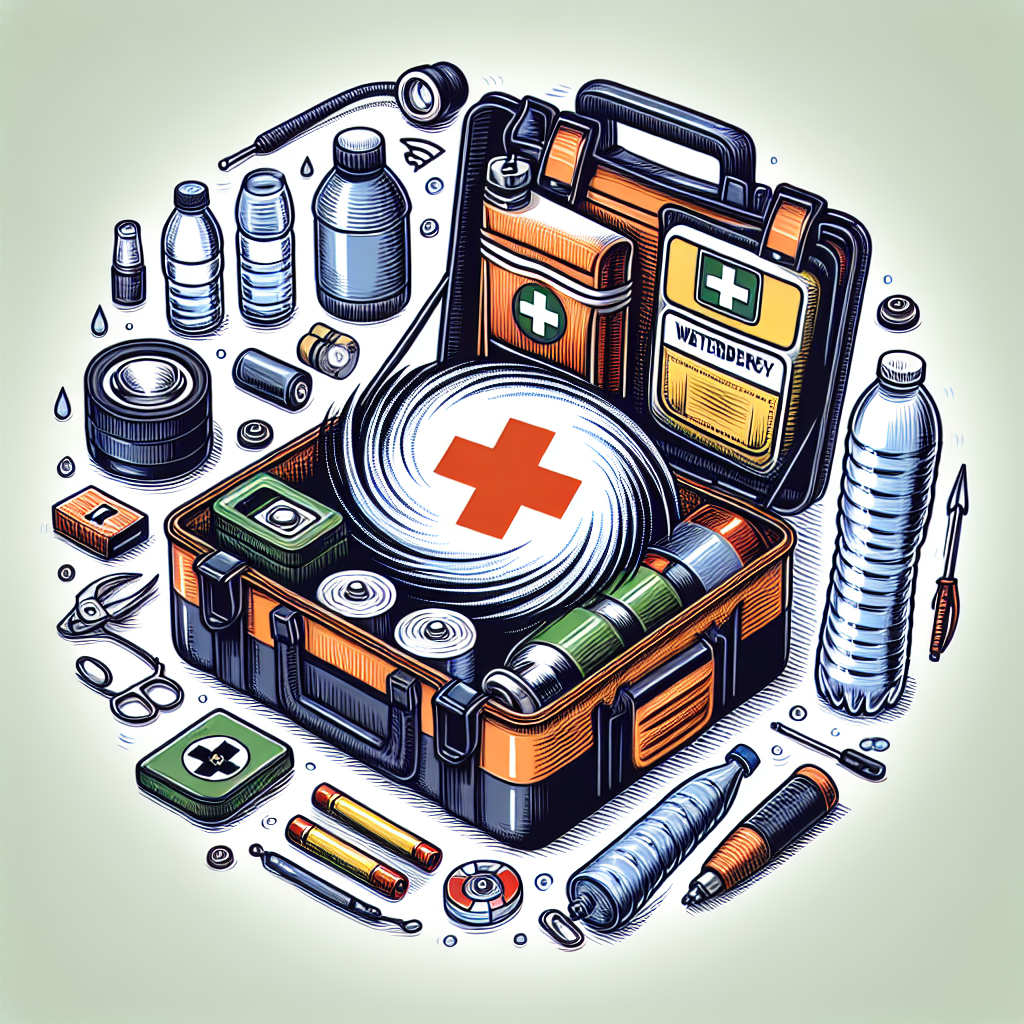When it comes to hurricanes, being prepared is key. From stocking up on essential supplies to creating an emergency plan, taking proactive steps can make a world of difference. In this article, you will discover valuable tips and strategies to enhance your preparedness for hurricanes. You’ll learn how to secure your home, gather necessary provisions, and stay informed to ensure the safety and well-being of yourself and your loved ones during a hurricane. So, grab a pen and paper, because this article will guide you on your journey to hurricane readiness.

Evacuation Plan
Know your evacuation zone
Knowing your evacuation zone is crucial in preparing for a hurricane. Each area is categorized based on the level of risk and potential impact from the storm. Contact your local authorities or visit their website to determine which zone you belong to. This knowledge will help you understand if and when you need to evacuate, ensuring your safety and the safety of your loved ones.
Develop a plan for family and pets
When a hurricane is approaching, it is essential to have a comprehensive plan in place for your family and pets. Designate a meeting point where everyone will gather and ensure that everyone understands the plan. In case of evacuation, determine where you will go and make arrangements accordingly. Don’t forget to include your pets in the plan, as many shelters do not allow animals. Research pet-friendly options or ask friends or relatives if they can accommodate you and your furry companions.
Identify designated evacuation routes
Familiarize yourself with the designated evacuation routes in your area. Local authorities will provide information on the safest and most efficient routes to take when evacuating. Have a map on hand, as GPS systems may not be reliable during times of crisis. It is crucial to plan alternate routes as well in case the primary routes become congested or inaccessible. Knowing the evacuation routes in advance will enable you to evacuate swiftly and avoid unnecessary risks.
Keep a list of emergency contacts
Compile a list of important emergency contacts and keep it readily accessible. Include local authorities, emergency services, and utility companies on this list. Additionally, ensure you have the contact information for family members, neighbors, and friends who can offer assistance or support during emergencies. It is also advisable to have the contact information for your insurance company and medical professionals. Store this list in a waterproof container or make a digital copy that can be easily accessed.
Emergency Supplies
Stock up on non-perishable food and water
When preparing for a hurricane, it is vital to stock up on non-perishable food items and water. Aim to have a supply that will last each person in your household at least three days. Canned goods, dry snacks, and bottled water are excellent options. Remember to check the expiration dates regularly and rotate your supplies to ensure freshness. Don’t forget to include a manual can opener and necessary utensils.
Gather essential medication and first aid kit
Ensure you have an ample supply of essential medications for each member of your family. Consider having a backup supply in case you are unable to access a pharmacy during the storm. Keep your medications in a waterproof container or bag to protect them from potential damage. Additionally, assemble a well-stocked first aid kit that includes bandages, antiseptic ointment, pain relievers, and any specific medications or supplies for existing medical conditions.
Prepare a supply of battery-powered devices and flashlights
During a hurricane, power outages are expected. Be prepared by having a supply of battery-powered devices such as flashlights, portable radios, and extra batteries. Avoid using candles as they pose a fire hazard. Ensure that your devices and flashlights are in working order prior to the storm and keep them easily accessible. This will provide you with essential light and information during power outages.
Include cash and important documents
In emergency situations, access to banks and ATMs may be limited or unavailable. It is wise to have a supply of cash on hand in case you need to purchase supplies or services. Remember to include small bills as change may be scarce. Additionally, gather important documents such as identification, insurance policies, property deeds, and birth certificates. Place them in a waterproof container or make digital copies that can be accessed remotely. These documents are crucial for recovery and insurance purposes.
Securing Your Home
Trim trees and secure loose objects
Before hurricane season begins, take the time to evaluate the trees on your property. Trim any branches that hang close to your house, as they can become dangerous projectiles during high winds. Secure loose objects in your yard, such as patio furniture, grills, or outdoor decorations. These items can be picked up by strong winds and cause significant damage to your property or neighboring areas.
Install storm shutters or apply window protection film
Protecting your windows is essential to prevent the entry of debris and reduce the risk of shattered glass during a hurricane. Installing storm shutters is an effective way to shield your windows from high winds and flying objects. If storm shutters are not available, you can opt for window protection film, which provides a layer of reinforcement. Properly securing your windows can minimize damage to your home and maintain its structural integrity.
Reinforce garage doors and secure outdoor furniture
Garage doors are susceptible to damage during hurricanes due to their large size and vulnerability to strong winds. Reinforce your garage doors with braces or install a hurricane-resistant door. Additionally, secure any outdoor furniture, tools, or equipment that could be moved or damaged by the storm. Anchoring these items or storing them indoors will prevent them from becoming hazards or causing damage during high winds.
Inspect and repair the roof
A well-maintained roof is vital in protecting your home during a hurricane. Before the storm season begins, inspect your roof for any damaged or loose shingles, as these can be easily ripped off by strong winds. Ensure that all areas around vents, chimneys, and skylights are properly sealed to prevent water infiltration during heavy rainfall. If necessary, hire a professional to make the necessary repairs or reinforcements to ensure the integrity of your roof.
Communication Plan
Designate a family member as an out-of-state contact
During a hurricane, local communication networks may become overwhelmed or unreliable. Designate a family member or friend who lives outside the affected area as your out-of-state contact. Share this individual’s contact information with all family members and friends. In case of separation or loss of communication, contacting your designated out-of-state contact can help relay messages and provide updates on everyone’s well-being.
Have a backup communication method
In addition to cell phones, it’s important to have a backup communication method that doesn’t rely on electricity or cellular networks. Consider purchasing a battery-powered or hand-cranked radio to stay informed about weather updates and emergency instructions. Invest in a satellite phone or two-way radios as well, which can enable communication within your household or with neighbors during power outages or loss of cell service.
Establish an emergency meeting point
Establishing an emergency meeting point is crucial if your family is separated during a hurricane. Choose a location that is easily accessible and known to all family members. This could be a trusted neighbor’s house, a community center, or a designated shelter. Make sure everyone understands the importance of meeting at this location and have a contingency plan in case the primary meeting point is not accessible.
Teach children how to use emergency phones
It’s essential to educate children on how to use emergency phones and when to do so. Show them how to dial emergency services and explain which situations require immediate assistance. Talk to them about the importance of staying calm during emergencies and provide them with a list of important contact numbers they can access if needed. Regularly reviewing these procedures will ensure that they feel prepared and confident in their ability to seek help if necessary.

Insurance Coverage
Review and update your homeowners insurance policy
Reviewing and updating your homeowners insurance policy is a crucial step in hurricane preparedness. Contact your insurance provider and ensure your policy adequately covers potential damages caused by hurricanes, including wind and flood damage. Take note of any necessary adjustments or additional coverage options that may be required. Understanding your policy’s coverage and deductible is essential to expedite the claims process in the event of damages.
Consider additional flood insurance
Standard homeowners insurance policies often do not cover flood damage. Consider purchasing additional flood insurance to protect your home and belongings. Flooding can be a significant risk during hurricanes, even in areas that are not prone to regular flooding. Consult with your insurance provider to understand the coverage options available to you and determine the appropriate level of coverage for your property.
Take inventory of your belongings
Creating a comprehensive inventory of your belongings can be invaluable in the event of damage or loss caused by a hurricane. Document each item and its estimated value through written lists, photographs, or videos. Store this inventory in a safe place, such as a safety deposit box or cloud storage. Maintaining an accurate inventory will simplify the claims process and ensure you receive fair compensation for your damaged or lost belongings.
Keep copies of important documents in a safe place
Make copies of important documents, such as identification cards, insurance policies, medical records, and property deeds. Store these copies in a waterproof container or make digital copies that can be accessed remotely. Having duplicates of these documents ensures that you can provide necessary information and proof of ownership in the aftermath of a hurricane. Store the originals in a safe location, such as a fireproof safe or a safety deposit box.
Emergency Shelter
Identify local shelter options
In the event of an evacuation, identify the local shelter options available in your community. Contact your local emergency management agency or visit their website to obtain information about nearby shelters. Familiarize yourself with their locations, operating hours, and any specific guidelines or requirements. Public schools, community centers, or designated shelters may be available, providing a safe haven during a hurricane emergency.
Make necessary arrangements for pets
Many shelters do not allow pets, so it is crucial to make arrangements for your furry family members ahead of time. Research pet-friendly shelters or contact local veterinary clinics or animal shelters to inquire about their hurricane preparedness plans. Consider finding a trusted friend or family member outside the affected area who can accommodate your pets during the storm. Ensure your pets have identification tags and update their microchip information to increase the chances of being reunited if separated.
Pack a disaster supply kit for the shelter
When evacuating to a shelter, it is essential to have a disaster supply kit prepared. This kit should include essential items such as non-perishable food, water, medications, first aid supplies, blankets, and personal hygiene items. Additionally, pack extra clothing, important documents, and comfort items for each family member. Consider any specific needs, such as baby supplies or necessary medical equipment, and include them in your kit. Remember that space may be limited in the shelter, so pack efficiently and prioritize essential items.
Bring necessary items for comfort and children
During an emergency shelter stay, it is crucial to ensure the comfort and well-being of all family members, especially children. Pack items to keep children entertained, such as books, board games, or small toys. Bring bedding or a familiar comfort item to help maintain a sense of security. Don’t forget to include any necessary supplies for infants, such as diapers, formula, and baby food. Taking these extra steps will help create a more positive and comfortable experience within the shelter environment.

Protecting Important Records
Store important documents in a waterproof container
When preparing for a hurricane, it is essential to protect your important documents from potential water damage. Purchase a waterproof container or use resealable plastic bags to safeguard documents such as identification cards, insurance policies, birth certificates, and social security cards. This simple precaution can help prevent the loss or destruction of vital documents that may be needed during the recovery process.
Make digital copies of important records
In addition to physical copies, make digital copies of your important records and store them securely. Utilize cloud storage or external hard drives to ensure that your digital copies are easily accessible even if your physical copies are compromised. Consider encrypting the files to protect sensitive information. Regularly update and maintain these digital copies to include any new or updated documents.
Keep a record of household inventory
Creating and maintaining a record of your household inventory is invaluable for insurance claims and post-hurricane recovery. Document each item, its estimated value, and any relevant information such as purchase dates or serial numbers. Include photographs or videos to support your inventory records. This comprehensive inventory will simplify the claims process and help ensure accurate compensation for damaged or lost items.
Store the documents in a safe location
Store your physical copies of important records in a safe location that is unlikely to be affected by a hurricane. A fireproof safe or a safety deposit box at a bank are excellent choices to protect your documents from potential damage. Remember to update the contents regularly and ensure that someone you trust has access to the safe or box in case you are unable to retrieve the documents yourself.
Preparation for Power Outages
Invest in a generator or alternative power source
During a hurricane, power outages are common and can last for extended periods. Investing in a generator or an alternative power source can provide a reliable backup in such situations. Research different types of generators and determine which one suits your needs and budget. Keep in mind that generators should be operated safely and placed outside to prevent carbon monoxide poisoning.
Keep a supply of batteries and chargers
Having a sufficient supply of batteries and chargers is essential during power outages. Stock up on various sizes of batteries, including those for flashlights, portable radios, and other battery-powered devices. Consider rechargeable batteries and portable chargers for your electronic devices. Conduct regular checks of your batteries’ functionality and ensure they are properly stored to maximize their lifespan.
Turn refrigerators and freezers to the coldest settings
Before a hurricane strikes, adjust the temperature settings in your refrigerator and freezer to the coldest levels. This step will help your perishable food items stay cooler for a longer period if your power goes out. Avoid opening the fridge or freezer unnecessarily, as each opening allows cool air to escape. By keeping the temperature low and minimizing the frequency of door openings, you can extend the freshness of your food during a power outage.
Unplug sensitive electronics to prevent damage
To protect your sensitive electronics from power surges when the power is restored, it is advisable to unplug them before the storm arrives. This includes computers, televisions, video game consoles, and other valuable devices. Power fluctuations during hurricane-related power outages can be damaging to electronic equipment. Unplugging these devices also reduces the risk of electrical fires caused by potential power surges.

Safety Tips During a Hurricane
Stay indoors and away from windows
During a hurricane, it is crucial to stay indoors and away from windows. Seek shelter in a small, windowless interior room on the lowest level of your home. If you live in a multi-story building, choose the most secure floor and avoid upper levels or areas vulnerable to high winds. Protect yourself and your family from flying debris by staying away from windows and taking cover until the storm has passed.
Use candles and open flames with caution
Candles can be used as a source of light during a power outage, but they should be used with caution. Keep candles in sturdy, non-flammable holders, away from flammable materials, and out of the reach of children or pets. Never leave candles unattended. Consider battery-powered or solar-powered lights as safer alternatives. If using open flames for cooking or heating, ensure proper ventilation and take necessary precautions to prevent carbon monoxide poisoning.
Do not use electrical appliances or touch electrical equipment
During a hurricane, it is essential to refrain from using electrical appliances or touching electrical equipment. This includes not using hair dryers, toasters, TVs, or any other appliances that require electricity. Unplugging these devices before the storm arrives can help prevent any damage caused by power surges when the power is restored. Assume all electrical wires or equipment may be live and treat them with caution to avoid the risk of electrocution.
Follow instructions from local authorities
During a hurricane, it is critical to stay informed and follow instructions from local authorities. Listen to weather updates and emergency broadcasts through a battery-powered radio or other reliable sources. Local authorities will provide guidance on evacuation orders, road closures, and other safety measures. Stay tuned to official announcements to ensure you have the most accurate and up-to-date information to make informed decisions for your safety and the safety of your family.
Recovery and Aftermath
Assess and document damages
Once the hurricane has passed and it is safe to do so, assess the damages to your property. Take photographs or videos of the damage as documentation for insurance claims. Make a detailed record of all the losses and damages you have incurred. This assessment will help expedite the claims process and ensure you receive full compensation for your losses.
Contact your insurance provider to initiate claims
After assessing damages, contact your insurance provider to initiate the claims process. Provide them with all necessary documentation, including photographs, videos, and a detailed inventory of damaged or lost items. Follow their instructions and deadlines for submitting claims. Keep a record of all communication with your insurance company, including dates, names of representatives, and any instructions or promises given.
Take steps to prevent further damage
To prevent further damage to your property, take immediate steps to secure any exposed areas or items. Cover damaged roofs or windows with tarps or plywood to prevent water infiltration. Remove debris or fallen trees that may pose a safety hazard or impede access. Take precautionary measures to minimize any additional damage that might occur while awaiting repairs or inspections.
Seek assistance from disaster recovery services
If your home has suffered extensive damage, consider seeking assistance from disaster recovery services. These organizations can help with debris removal, temporary repairs, and other essential support during the recovery process. Reach out to local government agencies or non-profit organizations that specialize in disaster recovery to inquire about available assistance programs. Take advantage of these resources to expedite your recovery and rebuild your life after the hurricane.
Remember, being prepared is your best defense against the unpredictable nature of hurricanes. By following these guidelines and taking the necessary precautions, you can enhance your safety, protect your belongings, and navigate through the challenges a hurricane may bring. Stay informed, stay safe, and stay prepared!






